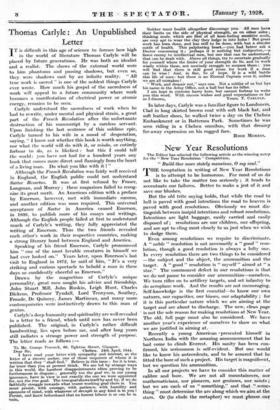Thomas Carlyle : An Unpublished Letter
IT is difficult in this age of science to foresee how high in the world of literature Thomas Carlyle will be placed by future generations. He was both an idealist and a realist. The shows of the external world were to him phantoms and passing shadows, but even so, they were shadows cast by an infinite reality. " All true work is sacred " is one of the noblest things Carlyle ever wrote. How much his gospel of the sacredness of work will appeal to a future conununity where work becomes a manifestation of electrical power or atomic energy, remains to be seen.
Carlyle understood the sacredness of work when he had to rewrite, under mental and physical strain, a great part of the French Revolution after the unfortunate destruction of his manuscript by a careless servant. Upon finishing the last sentence of this sublime epic, Carlyle turned to his wife in a mood of desperation, saying, " I know not whether this book is worth anything, nor what the world will do with it, or misdo, or entirely forbear to do, as is likeliest : but this I could tell the world : you have not had for a hundred years any book that comes more direct and flamingly from the heart of a living man. Do what you like with it I " AltheAgh the French Revolution was fairly well received in England, the English public could not understand Sartor Resartus. It was at first refused by Fraser, Longman, and Murray ; these magazines failed to recog- nize its great merit. An American edition with a preface by Emerson, however, met with immediate success, and another edition was soon required. This universal acceptance of Sartor in America caused Emerson, in 1818, to publish more of his essays and writings. Although the English people failed at first .to understand much of Carlyle's writing, they fully, appreciated the writing of Emerson. Thus the two friends revealed each other's work in their respective countries, making a strong literary bond between England and America.
Speaking of his friend Emerson, Carlyle pronounced him " one of the most lovable creatures in himself we had ever looked on." Years later, _upon Emerson's last visit to England in 1872, he said, of him, " It's a very striking and curious spectacle to behold a man in these days so confidently cheerful as Emerson."
Drawn by the magnetism of Carlyle's unique personality, great men sought his advice and friendship. John Stuart Mill, John Ruskin, Leigh Hunt, Charles Dickens, Professor Tyndall, Lord Tennyson, Southey, Fronde, De Quincey, James Martineau, and many more contemporaries were instinctively drawn to this man of genius.
Carlyle's deep humanity and spirituality are well revealed in a letter to a friend, which until now has never been published. The original, in Carlyle's rather difficult handwriting, lies open before me, and after long years still radiates a strange power and strength of purpose. The letter reads as follows :-
To Mr. George Peacock, 80, Egleton Street, Glasgow. Dear Sir, Chelsea. 24th April, 1844.
I have read your letter with sympathy and interest, as the letter of a sincere seeker, one of those enquirers of whom it is written that they " shall find." Believe in this issue : for it is true, far truer than you at present think. We are led by strange ways in this world, the harshest disappointments often proving to be furtherance in disguise ; generally too the goal we, in our young ignorance, have in view is not exactly the one we were appointed for, not the true goal. The true goal shows itself by and by, if we do faithfully struggle towards what truest-working goal there is. You must persist, with courage, with patience, with humility and openness of mind, with whatever of strength in any kind is in you ! Persist, and know beforehand that no honest labour is or can be in vain, Neither must health altogether discourage you. All men have their limits on the side of physical strength, as on other sides ; thinking souls, which are first of all keen-feeling sensitive souls, are very apt to wear the clay they lodge in into holes ! But great work has been done, and has still to be done, with but a slender outfit of health. This palpitating heart,—you had better ask a Doctor concerning it ; perhaps it is nothing but indigestion,—a fierce enemy to intellectual men, but one that can be understood, that can be dealt with. Above all things, try to ascertain gradually for yourself where the limits of your strength do lie, and to work wisely within these, not unwisely struggle to surpass them : you will find that there is still good room for work if a man can be wise ! Arid, in fine, be of hope. It is a wild battle this life of ours: but there is an' Eternal Captain over it, unless we are all mistaken
" Work, and despair not," says one. Not a soldier of us but his his name in the Army Office, not a ball but has its billet. I am kept in extreme hurry here, but cannot forbear to write you this word. With sincere wishes and good expectations so far as I discern, Yours, T. CARLYLE.
In later days, Carlyle was a familiar figure to Londoners. Clad in long skirted brosim coat with soft black hat, and soft leather shoes, he walked twice a day on the Chelsea Embankment or in Battersea Park. Sometimes he was seen riding in a Chelsea omnibus, with that dreamy far-away expression on his rugged face.
ROSE MORRIS.






































 Previous page
Previous page